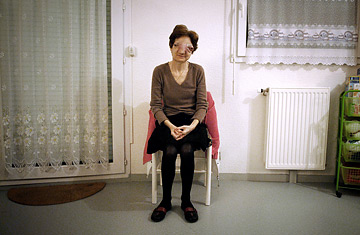
Chantal Sébire was found dead on Wednesday night. She had been suffering from esthesioneuroblastoma (ENB) an uncommon malignant neoplasm of the nasal vault.
Chantal Sébire is dead, but the debate she ignited over French laws prohibiting victims of terminal diseases from receiving euthanasia is certain to live on. Just 48 hours after a Dijon court rejected Sébire's request that doctors help her end her agony-stricken life without risking legal punishment, the 52 year-old was found dead in her home Wednesday night. Initial tests Thursday were unable to determine whether Sébire's death was induced or the result of the rare disease that left her horribly disfigured and in near-constant pain. But news of her passing provoked renewed dispute over France's ban on assisted suicide, which the former schoolteacher had sought to overturn in her final days.
Sébire came to national attention earlier this month, when French media picked up on her plea to get help ending her life. Her malady, esthesioneuroblastoma, causes inoperable tumors to grow in and spread from the nasal passages, disfiguring and destroying the face before finally destroying the brain. The disease had already blinded and otherwise handicapped Sébire, and left her wracked with pain for hours on end despite medication to allay her suffering. Sebire explained her request for medically assisted suicide saying she wanted to leave the world following an evening of celebration with her three children — and avoid the prolonged coma she'd most likely fall into, which would make her a burden to her family.
While campaigning for office, President Nicolas Sarkozy indicated he was sympathetic to revising France's current law, which forbids assisted suicide but allows doctors and families to stop administering life-sustaining treatment to terminal patients. But last week, the Elysée responded to Sébire's written request for help to Sarkozy by indicating he could not sidestep legislation. Ahead of Monday's court rejection of her petition that the law be interpreted to permit active euthanasia, members of France's conservative government similarly rebuffed Sébire's plea with reactions ranging from evident compassion and empathy to cold legal rationalization — and in at least one case, prickly indignation. Housing Minister Christine Boutin declared that she was "scandalized that people can envision granting this woman death because she's suffering and deformed," adding that if France legalizes "the right to kill, we're heading towards a barbarian society."
Yet despite ethical reservations, it became very clear Sébire's case deeply moved a majority of people in France, both in and out of government. "Her illness has left French people shattered these last days," said French government spokesman Luc Chatel when news of Sebire's death broke. "[Sébire] inspired great respect among our citizens."
Even more importantly, however, her case has also gotten many people across France reexamining their attitudes toward the assisted suicides of terminal patients that are legal in Belgium, Switzerland and the Netherlands. France's standing law was written in 2005, after a mother and doctor provoked the death of a young man who no longer wanted to live in his paralyzed, virtually shut-in condition. Marie Humbert — the mother of that man — has continued denouncing the law for only allowing the passive act of interrupting life-sustaining treatment. Some 300,000 people have signed Humbert's petition to depenalize active euthanasia.
Some French observers of Sébire's case note that laws banning assisted suicide haven't prevented it. Instead, they say, the prohibition has only sent the practice underground, where doctors and medical workers secretly consent to respect patients' pleas to end their lives via over-medication or other means that aren't often detected. Some suspect that may be how Sébire finally died. "I find it very difficult not to offer an exit door that isn't one of love with one's family," commented French Foreign Minister and trained doctor Bernard Kouchner on radio station RMC Thursday. In the future, he said, France must prevent desperate terminal patients from "having to commit suicide in some kind of clandestine manner in which everyone suffers — especially their loved ones. I have a lot of admiration for Chantal Sébire [and] we must create an exception to the law... that would be human, necessary."
